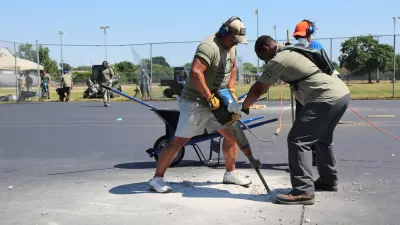Following the recent news that Architecture for Humanity shut its doors after operating since 1999, FastCo.Design provides more details about what went wrong.
The news of Architecture for Humanity's closure caught a lot of people off guard when it broke this month in the San Francisco Chronicle—including some of the organization's own volunteers. According to an article by Shaunacy Ferro, "[in] a way, Architecture for Humanity's public unraveling mirrors the deeper problems that ultimately contributed to its demise: disorganization, an inability to adapt, and simmering tension between the parent organization and its army of volunteers."
The article goes on provide more detail than previously reported about the organization's trouble keeping some projects on budget or, for that matter, completing them at all. The cause of the organizations downfall, ultimately, was a struggle to raise the funds necessary to support its increasingly global operations. In fact, in an addendum to the article, FastCo.Design reports that Architecture for Humanity expects to file for Chapter 7 bankruptcy in the next few weeks.
Although the article acknowledges that volunteers working at local chapters could move forward with projects still under development, there will be a lot of confusion about how to do that until the organization's bankruptcy is figured out.
FULL STORY: What's Next For Architecture For Humanity?

Planetizen Federal Action Tracker
A weekly monitor of how Trump’s orders and actions are impacting planners and planning in America.

Map: Where Senate Republicans Want to Sell Your Public Lands
For public land advocates, the Senate Republicans’ proposal to sell millions of acres of public land in the West is “the biggest fight of their careers.”

Restaurant Patios Were a Pandemic Win — Why Were They so Hard to Keep?
Social distancing requirements and changes in travel patterns prompted cities to pilot new uses for street and sidewalk space. Then it got complicated.

Platform Pilsner: Vancouver Transit Agency Releases... a Beer?
TransLink will receive a portion of every sale of the four-pack.

Toronto Weighs Cheaper Transit, Parking Hikes for Major Events
Special event rates would take effect during large festivals, sports games and concerts to ‘discourage driving, manage congestion and free up space for transit.”

Berlin to Consider Car-Free Zone Larger Than Manhattan
The area bound by the 22-mile Ringbahn would still allow 12 uses of a private automobile per year per person, and several other exemptions.
Urban Design for Planners 1: Software Tools
This six-course series explores essential urban design concepts using open source software and equips planners with the tools they need to participate fully in the urban design process.
Planning for Universal Design
Learn the tools for implementing Universal Design in planning regulations.
Heyer Gruel & Associates PA
JM Goldson LLC
Custer County Colorado
City of Camden Redevelopment Agency
City of Astoria
Transportation Research & Education Center (TREC) at Portland State University
Camden Redevelopment Agency
City of Claremont
Municipality of Princeton (NJ)



























